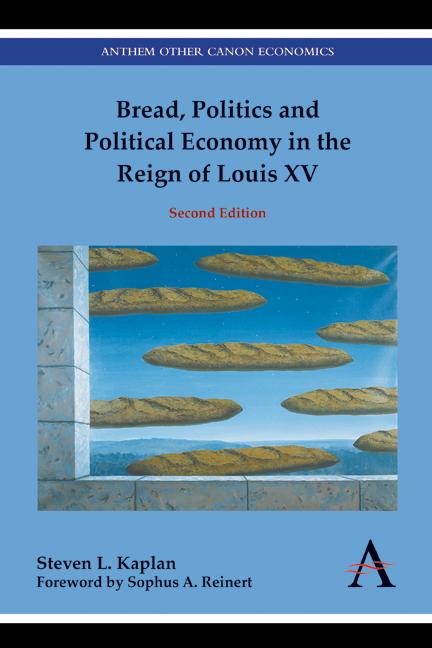Book contents
- Frontmatter
- Contents
- List of Illustrations
- Foreword to the Second Edition
- Acknowledgements
- List of Abbreviations
- Introduction
- Chapter I The Police of Provisioning
- Chapter II The Regulations and the Regulators
- Chapter III The Origins of Liberty
- Chapter IV The Response to Liberalization: Theory and Practice
- Chapter V Forcing Grain to Be Free: The Government Holds the Line
- Chapter VI The Reforms and the Grain Trade
- Chapter VII Paris
- Chapter VIII The Royal Trump
- Chapter IX The Government, the Parlements, and the Battle over Liberty: I
- Chapter X The Government, the Parlements, and the Battle over Liberty: II
- Chapter XI From Political Economy to Police: The Return to Apprehensive Paternalism
- Chapter XII Policing the General Subsistence, 1771–1774
- Chapter XIII The King's Grain and the Retreat from Liberalization
- Conclusion
- Bibliography
- Index
Chapter XIII - The King's Grain and the Retreat from Liberalization
- Frontmatter
- Contents
- List of Illustrations
- Foreword to the Second Edition
- Acknowledgements
- List of Abbreviations
- Introduction
- Chapter I The Police of Provisioning
- Chapter II The Regulations and the Regulators
- Chapter III The Origins of Liberty
- Chapter IV The Response to Liberalization: Theory and Practice
- Chapter V Forcing Grain to Be Free: The Government Holds the Line
- Chapter VI The Reforms and the Grain Trade
- Chapter VII Paris
- Chapter VIII The Royal Trump
- Chapter IX The Government, the Parlements, and the Battle over Liberty: I
- Chapter X The Government, the Parlements, and the Battle over Liberty: II
- Chapter XI From Political Economy to Police: The Return to Apprehensive Paternalism
- Chapter XII Policing the General Subsistence, 1771–1774
- Chapter XIII The King's Grain and the Retreat from Liberalization
- Conclusion
- Bibliography
- Index
Summary
Whereas Laverdy used the king's grain to facilitate the transition from a police to a liberal regime, Terray used it to facilitate the transition from a liberal to a police regime. There are of course other important differences and many striking similarities between the government grain operations of the sixties and of the seventies: we explore some of them in the pages that follow.
This chapter begins with an examination of the situation inherited by Terray when he replaced Maynon d'lnvau at the end of 1769. It considers the broad outlines of the new Controller-General's strategy before turning to several case studies of victualing enterprises. The operations launched under Terray's aegis were far greater in scale and ambition than the provisioning activities undertaken in the sixties in the shadow of liberalization. The men involved were in the main much more like Leray de Chaumont than Pierre Malisset, bankers and négociants rather than bakers and millers. Instead of signing a contract with a group of suppliers, Terray created a quasi-governmental organization called a régie. This chapter focuses on the practices and problems of the régie. Of the many troubles encountered or generated by the régie, the most serious concerned its reputation in the eyes of the public: we shall see that the famine pact persuasion did not die with the demise of the liberals, even if it changed somewhat in tone and emphasis. The last third of the chapter is devoted to denouement—not only the outcome of the king's grain administration under Terray, but in a more general sense the unraveling of some of the questions which have preoccupied us from the outset.
I
Maynon d'lnvau passed the king's grain operation to Terray in a highly equivocal state. Maynon, as we have seen, would have liked to abjure the government supply role completely. Like the économistes, he regarded official grain dealings as improvident, unavailing, and inimical to the development of a powerful, autonomous grain trading community serving the general interest according to the laws of nature. He warned his intendants that they could not count on the central government for assistance and he announced that he would not renew the provisioning connections with several provinces which the ministry had arranged.
- Type
- Chapter
- Information
- Bread, Politics and Political Economy in the Reign of Louis XV , pp. 614 - 676Publisher: Anthem PressPrint publication year: 2015

